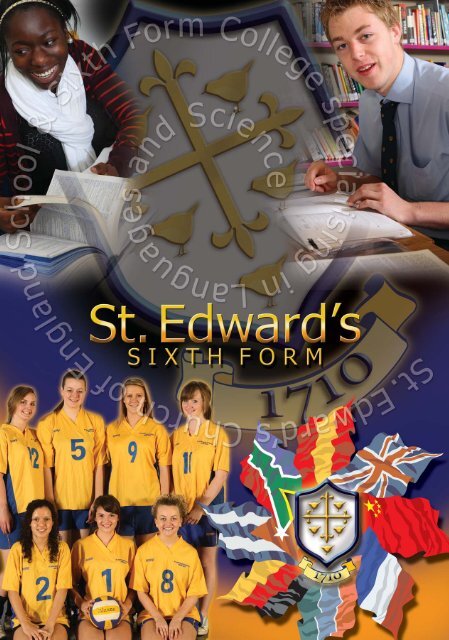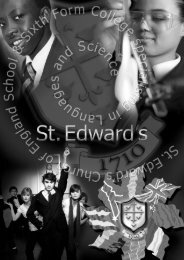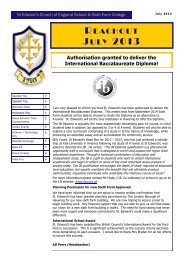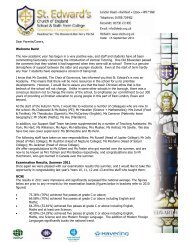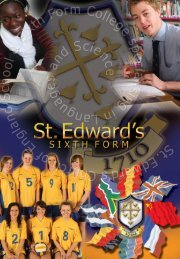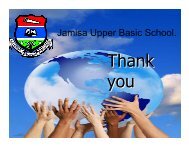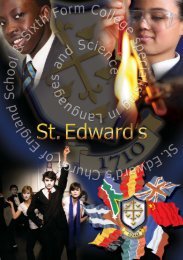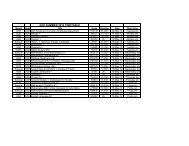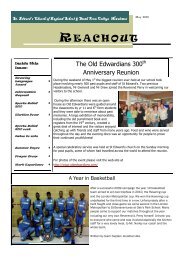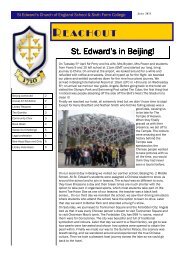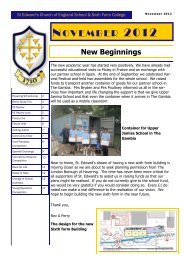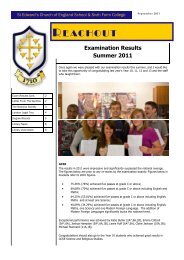Sixth Form - St Edward's C of E School
Sixth Form - St Edward's C of E School
Sixth Form - St Edward's C of E School
You also want an ePaper? Increase the reach of your titles
YUMPU automatically turns print PDFs into web optimized ePapers that Google loves.
<strong>St</strong> Edward’s C <strong>of</strong> E <strong>School</strong> and <strong>Sixth</strong> <strong>Form</strong> College<strong>St</strong>udents at <strong>St</strong> Edward’s <strong>Sixth</strong> may follow a wide variety <strong>of</strong> courses to meet their needs and interests:AS Levels /A Levels:AS is short for advanced subsidiary. It is a free standingqualification but will also make up half <strong>of</strong> a full A Level.<strong>St</strong>udents can take 4 <strong>of</strong> the following subjects.• Accounting• Applied Science• Art• Art Textiles• Biology• Business <strong>St</strong>udies• Chemistry• Classical Civilisation• Drama and Theatre <strong>St</strong>udies• English Language• English Literature• Ethics and Philosophy• Food Technology• Further Mathematics• Geography• Government and Politics• Graphic Design – Product Design• History• ICT (Applied A Level)• Mathematics• Media <strong>St</strong>udies• Modern Foreign Languages (French, German and Spanish)• Music• Music TechnologyBTEC inSport and Exercise Science:This is a level 2 qualification.It is the equivalent <strong>of</strong> 2 A Levels.It is assessed by coursework throughout the 2 yearcourse. It is designed to provide specialist work-relatedqualifications in a variety <strong>of</strong> different sectors, givinglearners the knowledge, understanding and skills theyneed to prepare them for employment.<strong>St</strong>udents are advised to take 1 or 2 A Levels in conjunctionwith this qualification.The Extended ProjectQualification (EPQ):The Extended Project was designed on guidance fromUniversities. It has 2 components. <strong>St</strong>udents will be taughtkey skills that can be transferred into all areas <strong>of</strong> study suchas presentation skills. They will also have the opportunity todevelop a project from an area <strong>of</strong> personal interest or activityoutside their A Level option or expand on work from one <strong>of</strong>their A Level subjects. They can choose to produce a product,an artefact or a report.<strong>St</strong>udents will, with supervision;• choose an area <strong>of</strong> interest• draft a title and aims <strong>of</strong> the project for formal approvalby the their supervisor in school• plan, research and carry out the project• deliver a presentation to a specified audience• provide evidence <strong>of</strong> all stages <strong>of</strong> project developmentand production for assessment.It is the equivalent <strong>of</strong> an AS Level and is graded from anA*- E.• Physical Education• Physics• Psychology• RS - Christian <strong>St</strong>udies• SociologyEntry requirements for A Level courses are indicated onthe opposite page.In addition to these subjects all students will sit an ASLevel General <strong>St</strong>udies .1
Entry Requirements for <strong>St</strong> Edward’s <strong>Sixth</strong> <strong>Form</strong> 2011<strong>St</strong>udents must achieve the following at GCSE -A minimum total <strong>of</strong> 50 points rather than aggregateA* = 8A = 7B = 6C = 5D = 4E = 3F = 2G = 1Short courses are worth half these points.Double award, BTEC, GNVQ, DiDA, and AiDA qualifications are worth double thenumber <strong>of</strong> points.<strong>St</strong>udents should also have achieved a grade C in both Mathematics and English.There are also a number <strong>of</strong> subject specific requirements. This information isavailable within the individual subject comments <strong>of</strong> the prospectus.Option Guidance/Support:• 13th October 2011: <strong>Sixth</strong> <strong>Form</strong> Open Evening - <strong>St</strong>aff will be available to discuss A Level choices• October – December: <strong>St</strong>udents from other schools can arrange a tour <strong>of</strong> the school• Friday 3rd February 2012: Admission forms should be submitted by email to Mrs Ager at thefollowing email address: JAger@steds.org.uk. The admission forms will be available on the schoolwebsite from mid October.• February – April 2012: Guidance meetings with <strong>Sixth</strong> <strong>Form</strong> Leadership Team to discuss optionsin light <strong>of</strong> mock GCSE examination results• 2nd – 3rd July 2012: <strong>Sixth</strong> <strong>Form</strong> Induction. This provides the students with the opportunity toexperience a trial lesson to see if the subjects chosen suit their interestsA Level examination results and Universitydestinations are available on the school website2
Business <strong>St</strong>udiesExam Board:AQACourse Requirements:The course provides a smooth transition from GCSEBusiness <strong>St</strong>udies to AS/A level, but GCSE Business <strong>St</strong>udiesis not necessary to take this subject at this level. At leasta grade C in Maths is necessary if students are to copesuccessfully with the financial aspects <strong>of</strong> the course.Course Content:You will:• develop a critical understanding <strong>of</strong> organisations, themarkets they serve and the process <strong>of</strong> adding valueconsider the internal workings and management <strong>of</strong>organisations, in particular the process <strong>of</strong> decisionmakingin a dynamic external environment• become aware that business behaviour can be studiedfrom the perspectives <strong>of</strong> a range <strong>of</strong> stakeholdersincluding customers, managers, creditors, owners/shareholders and employees• be aware <strong>of</strong> the economic, environmental, ethical,governmental, legal, social and technological issuesassociated with business activity• acquire a range <strong>of</strong> skills, including decision making andproblem-solving in the light <strong>of</strong> evaluation and, whereappropriate, the quantification and management <strong>of</strong>information• be aware <strong>of</strong> the current structure <strong>of</strong> business andbusiness practice in different sectors and environments,including large and small organisations, manufacturingand service industries, local, regional, national andmultinational, pr<strong>of</strong>it and non pr<strong>of</strong>it-making entities• be expected to use Information Technology throughoutthe course as a tool to aid understanding <strong>of</strong> thesubject contentAssessment:By examination onlyAS LevelUnit 1 - Planning and Financing a Business (20%)Unit 2 - Managing a Business (30%)A LevelUnit 3 - <strong>St</strong>rategies for Success (25%)Unit 4 - The Business Environment and Managing Change (25%)Career Opportunities/Progression:Take a degree course in Business <strong>St</strong>udies or any businessrelated area such as Administration, Finance, HumanResource Management or Marketing, (some top Businesscourses require a high level <strong>of</strong> Mathematical ability soA level Maths would be an advantage for some students)Take an HND in any business area.This will support direct entry into employment in any area<strong>of</strong> business.For further information please contact: Miss Metcalf6
ChemistryExam Board:AQACourse Requirements:The qualification builds on the knowledge, understandingand process skills inherent in GCSE. It is expected thatyou will have achieved a GCSE grade B in Chemistry orScience (both Core and Additional Science). During thecourse, students will be expected to handle and interpretdata. It would therefore be very helpful to have achieveda GCSE grade B in Mathematics, although grade CMathematics will be considered.Course Content:You will stimulate and sustain your interest in, andenjoyment <strong>of</strong> chemistry. You will also gain greater knowledgeand understanding <strong>of</strong> chemistry and to appreciate theinter-linking patterns present in the subject. The courseshows the relevant application and value <strong>of</strong> chemistry tosociety and how it may be used responsibly. You will have theopportunity to develop your skills in laboratory proceduresand techniques and develop your ability to acquireknowledge by means <strong>of</strong> practical work.The course also provides opportunities for you to bringtogether knowledge <strong>of</strong> how different areas <strong>of</strong> chemistryrelate to each other.Assessment:By examination and internal practical skillsassessmentAS levelUnit 1 - Foundation Chemistry (16.7%)Unit 2 - Chemistry in Action (23.3%)Unit 3 - Investigative and Practical Skills (10%)A LevelUnit 4 - Kinetics, Equilibria and Organic Chemistry (16.7%)Unit 5 - Energetics, Redox and Inorganic Chemistry (23.3%)Unit 6 - Investigative and Practical Skills (10%)Career Opportunities/Progression:Follow a degree course in Chemistry, Environmental Science,Medicine and Pharmacy. Follow a Higher Nationalprogramme in Applied Chemistry and related programmes,such as Sport <strong>St</strong>udies, Beauty Therapy, Applied Biology,Engineering, Agriculture, Animal Management, CountrysideManagement, Environmental Science, Equine Managementor Horticulture.Employment in the area <strong>of</strong> pharmacy and biotechnology.Employment in the area <strong>of</strong> the health pr<strong>of</strong>essions,biotechnology, catering, and land management.Classical CivilisationExam Board:AQACourse Requirements:There is no need to have studied any particular GCSE,although it would be expected that you would have atleast a grade C at GCSE English Language. You wouldneed to be interested in learning about the history andliterature <strong>of</strong> the Ancient Greek and Roman worlds.The course does not require you to study Latin orClassical Greek.Course Content:You will learn how to read and understand primary sources,classical sources and secondary sources. This will helpyou learn and appreciate the history, literature, cultureand achievements <strong>of</strong> the Romans and the Greeks.You will develop your communication skills as youcommunicate your knowledge and understanding <strong>of</strong> thesubject in writing and speaking.Assessment:By examination onlyEach unit has equal weightingAS LevelUnit 1 - An introduction to an aspect <strong>of</strong> ClassicalCivilisation 1 (Women in Athens and Rome)Unit 2 - An introduction to an aspect <strong>of</strong> ClassicalCivilisation 2 (Homer's Odyssey)A levelUnit 3 - A study <strong>of</strong> an aspect <strong>of</strong> Classical Civilisation 1(Green Tragedy)Unit 4 - A study <strong>of</strong> an aspect <strong>of</strong> Classical Civilisation 2(Tiberius and Claudius)Career Opportunities/Progression:Go to university to study Classical Civilization or AncientHistory. Take any Arts or Humanities degree with a deeperunderstanding <strong>of</strong> the roots <strong>of</strong> the subject.Be a better informed person who appreciates the origin<strong>of</strong> many features <strong>of</strong> modern European life.If you intend to take History at university you should giveserious consideration to taking Classical Civilisation alongsideHistory at A-level.For further information please contact: Mr BennettFor further information please contact: Miss Alexander7
Drama and Theatre <strong>St</strong>udiesExam Board:AQACourse Requirements:It is useful to have taken Drama at GCSE but not essential.It is important that you are interested in gaining a greaterunderstanding <strong>of</strong> how theatre and plays work, and thatyou are keen to be involved in practical work as bothactor and director. It is essential that you have at least Cgrades in both English GCSEs before you start the course.Course Content:The course demands practical, creative and communicationskills in almost equal measure. You will extend your abilityto create theatre in performance. You will also be requiredto write about theatre and to develop your powers <strong>of</strong>analysis, becoming an informed critic. The course willinvolve creating your own piece <strong>of</strong> theatre as well asstudying plays, playwrights and theatre practitionersthrough practical and written work.Assessment:The structure <strong>of</strong> the specification at each level, AS and A2,is one written unit (60%) and one practical unit (40%).AS LevelUnit 1 - Live Theatre Production Seen and PrescribedPlay (30%)Unit 2 - Presentation <strong>of</strong> an Extract from a Play withSupporting Notes (20%)A LevelUnit 3 - Further Prescribed Plays including Pre-TwentiethCentury (30%)Unit 4 - Presentation <strong>of</strong> Devised Drama with SupportingNotes (20%)The written units are externally set and marked.The practical units are internally assessed by the teacherand externally moderated by a visiting moderator.Career Opportunities/Progression:Higher Education at degree or HND level. It can be usedas part <strong>of</strong> your course to broaden your studies and maylead on to a career in the performing arts industries.Theatre <strong>St</strong>udies AS/A level complements a range <strong>of</strong> subjectsand is useful in building confidence and improvingpresentation skills in a range <strong>of</strong> careers.For further information please contact: Mrs Allen18
English LanguageExam Board:AQACourse Requirements:This course builds on some <strong>of</strong> the knowledge andunderstanding <strong>of</strong> GCSE English. It would help if you havean active interest in language. During the course, studentswill need to be able to communicate effectively, researchinformation from a variety <strong>of</strong> sources and express themselvesclearly and fluently in written form. Ideally studentsshould have obtained a grade B in English Language butconsideration will be given to those who achieved a grade C.Course Content:You will study a wide range <strong>of</strong> topics such as how issues<strong>of</strong> gender, power and the growth in communicationtechnology affect language use. You will also develop anunderstanding <strong>of</strong> how children acquire language and howand why language changes over time.During the course you will learn to select and apply a range<strong>of</strong> linguistic methods and show critical understanding <strong>of</strong> arange <strong>of</strong> concepts and issues relating to meaning in spokenand written language.You will be able to:• Analyse and evaluate the influence <strong>of</strong> contextual factorsin both written and spoken language.• Show knowledge <strong>of</strong> the key parts <strong>of</strong> language.• Demonstrate expertise and creativity in the use <strong>of</strong>English in a range <strong>of</strong> different contexts which showyour linguistic knowledgeAssessment:By examination and coursework.The coursework units comprise 40% <strong>of</strong> the full A Leveland the examinations 60%.AS LevelUnit 1 - Categorising textsUnit 2 - Creating texts (coursework)A LevelUnit 3 - Developing LanguageUnit 4 - Investigating Language (coursework)Career Opportunities/Progression:You could go on to study linguistics at university or mostcourses at degree level. You could use this A level aspro<strong>of</strong> <strong>of</strong> your good written communication skills. A Mediacareer. Use language more effectively both orally and inwriting in any career.For further information please contact: Mr DelaneyEnglish LiteratureExam Board:AQACourse Requirements:This course builds on some <strong>of</strong> the knowledge andunderstanding <strong>of</strong> GCSE English Literature. Ideally studentsshould have obtained a grade B in English Literature butconsideration will be given to those who achieved a grade C.During the course, students will need to communicateeffectively, research information from a variety <strong>of</strong> sourcesand express themselves, giving clear opinions about texts,supported with well developed arguments. You will read arange <strong>of</strong> prose, drama and poetry as well as critical works.Success at A Level is dependent on you sustaining a widerange <strong>of</strong> personal reading.Course Content:You will:• learn to articulate creative, informed and relevantresponses to literary texts, using appropriate terminologyand concepts, and coherent, accurate written expression• demonstrate a detailed critical understanding inanalysing the ways in which structure, form andlanguage shape meanings in literary texts• explore connections and comparisons between differentliterary texts, informed by interpretations <strong>of</strong> other readersdemonstrate understanding <strong>of</strong> the significance andinfluence <strong>of</strong> the contexts in which literary texts arewritten and received.Assessment:You will study 2 units for the AS level and 2 units forA level. There is a coursework module for one <strong>of</strong> the unitsat both AS and A level:The units will involve studying the following:AS LevelAspects <strong>of</strong> NarrativeDramatic GenresA LevelTexts and GenresFurther and independent readingCareer Opportunities/Progression:Literature is welcomed as a qualification for many careersand provides a wide range <strong>of</strong> opportunities for courses inthe Arts, Humanities, Media and Communication as wellas teaching, law and journalism.For further information please contact: Mr Delaney9
Ethics and PhilosophyFood TechnologyExam Board:OCRCourse Requirements:No prior knowledge <strong>of</strong> Religious <strong>St</strong>udies is required althoughstudents may find this helpful.You will need to feel competent with continuous writingand research and so a grade C in English is required.Course Content:This is a challenging thought provoking course centredaround the Christian and secular responses to moral issues.<strong>St</strong>udents will also develop their skills in Philosophicaldiscussion. You will study:• Basic Philosophy looking at Classical Greek thought inPlato and Aristotle, their thoughts about body, soul,goodness, cause and purpose; the Judaeo-Christianideas <strong>of</strong> God as creator, good and active in the world;traditional arguments for the existence <strong>of</strong> God andchallenges to religious belief.• Ethical terms like good, bad, right and wrong; anintroduction to various ethical theories. Situation andVirtue ethics, Natural Law. Thinking <strong>of</strong> Immanuel Kant,Utilitarianism, Religious Ethics, absolute and relativemorality. Theses are applied to various contemporarymoral issues; abortion, euthanasia; right to life; rightto a child; genetic engineering and embryo research.Assessment:By examination onlyEach unit has equal weightingAS LevelUnit 1 - Philosophy <strong>of</strong> ReligionUnit 2 - Religious EthicsA LevelUnit 3 - Philosophy <strong>of</strong> ReligionUnit 4 - Religious EthicsCareer Opportunities/Progression:With a qualification in Religious <strong>St</strong>udies, you can go onto higher education at College or University or seekemployment.The skills developed would be useful for careers in law,education, social work, politics, medicine, businessadministration and the media.For further information please contact: Mr WelsbyExam Board:AQACourse Requirements:This course builds on some topics and practical skillscovered in both GCSE Food Technology and also Catering,exploring them in greater depth. A passion for workingand experimenting with food is essential. <strong>St</strong>udents mustbe able to work competently with food and have mastereda good range <strong>of</strong> practical skills.<strong>St</strong>udents will need to be creative and have a logicalapproach to work as they will be required to research andinvestigate various perspectives <strong>of</strong> the Food industry in thedevelopment and analysis <strong>of</strong> food products.Course Content:You will:• develop an understanding <strong>of</strong> the physical properties <strong>of</strong>a broad range <strong>of</strong> ingredient and components and theirspecific use in products. Explore the processes andmanufacturing techniques involved in producing foodproducts [including the use <strong>of</strong> CAD/CAM.]• manipulate, combine and compare food materials andcomponents as part <strong>of</strong> product development.• look at health and safety issues, consumer safety andcurrent legislation.• analyse food products in order to understand issuessuch as environmental sustainability <strong>of</strong> products, socialfactors, and the influences <strong>of</strong> culture.Assessment:By examination and courseworkEach unit has equal weightingAS LevelUnit 1 - Materials, Components and ApplicationUnit 2 - Learning through Designing and Making(50 hours <strong>of</strong> work to generate a product or 2smaller portfolio pieces)A LevelUnit 3 - Design and ManufactureUnit 4 - Design and Making Practice(60 hours <strong>of</strong> work to generate a single design)Career Opportunities/Progression:You could go on to follow a degree course in a Food relatedstudy such as: Food Science; Public Health and Nutrition;Consumer Trading <strong>St</strong>andards; Microbiology to name just a few.There are many careers in the Food and Drink Industryin research, quality control, hygiene, packaging, foodmicrobiology and food analysis.You could follow an HND course for Retail Management,Health, or Dietetics.For further information please contact: Mrs Perry10
Further MathematicsExam Board:OCR MEICourse Requirements:It is advised that you achieve an A* grade in your GCSE.Individual consideration will be given to students whoachieve an A. You will also be studying Maths at AS levelat the same time.Course Content:Further Mathematics AS and A level not only builds onwork you will have met at GCSE, and the work you will bedoing at AS level but also involves new ideas that are notcovered in any other part <strong>of</strong> the maths curriculum.At AS level you will study Further Pure 1, Mechanics andDecision Maths 1.At A2 level you will study Mechanics 2, Decision 2 alongsideFurther Pure 2.Assessment:By examination onlyThe units are equally weightedAS LevelUnit FP1 - Further Concepts for Advanced MathematicsUnit M1 - Mechanics 1Unit D1 - Decision Mathematics 1A LevelUnit FP2 - Further Methods for Advanced MathematicsUnit M2 - Mechanics 2Unit D2 - Decision Mathematics 2Career Opportunities/Progression:AS Further Mathematics is very useful as a supportingsubject to many courses at A level especially in the Sciences,Geography, Psychology, Sociology and Medical courses.There are also many areas <strong>of</strong> employment that see aMathematics A level as an important qualification and itis <strong>of</strong>ten a requirement for the vocational qualificationrelated to these areas.Higher Education courses or careers that either requireA level Further Mathematics or courses that are stronglyrelated include:Engineering, Electronics, Maths, Computing, <strong>St</strong>atistics.For further information please contact: Mr ThomasGeographyExam Board:AQACourse Requirements:It is a requirement that you should have studiedGeography at GCSE. Several topics covered in the courseare developments <strong>of</strong> work covered at GCSE, but others arenew. It is important that you have a lively and enquiringmind, an interest in the environment and current affairs,a willingness to explore new ideas and an ability tocommunicate your ideas effectively.Course Content:Throughout this course you will be learning about therelationship <strong>of</strong> human populations to each other over spaceand time and their relationship with their physical environmentat a variety <strong>of</strong> scales from the local to the global.All units specified <strong>of</strong>fer opportunities for candidates toconsider their own roles, values and attitudes in relationto themes and issues being studied, and the roles, valuesand attitudes <strong>of</strong> others including decision makers.At AS the course focuses on the following areas:• The core physical section:Rivers, floods and management• Optional physical topics:Cold environments, coastal environments and desertenvironments• The core human section:Population change• Optional human topics:Food supply issues, energy issues, health issuesAt A2 students examine the hazards related to climate andplate tectonics. They also investigate the development <strong>of</strong>world cities and the challenges <strong>of</strong> globalisation.Assessment:By examination onlyAS LevelUnit 1 - Physical and Human Geography (35%)Unit 2 - Geographical Skills (15%)A levelA2 Unit 3 - Contemporary Geographical Issues (30%)A2 Unit 4B - Geographical Issue Evaluation (20%)Career Opportunities/Progression:You will have access to a wide range <strong>of</strong> possible careerand higher education possibilities. You will have learnt andused a variety <strong>of</strong> transferable skills throughout the course,for example collecting and analysing and interpreting data.These skills are in great demand by employers anduniversities and can lead to a wide range <strong>of</strong> employmentopportunities such as law, accounting and journalism.For further information please contact: Ms Tubridy11
Government and PoliticsExam Board:EdexcelCourse Requirements:You do not need to have studied Government and Politicsor History at GCSE in order to take an AS or A level coursein the subject. It is more important that you should have alively and enquiring mind, an interest in politics and currentaffairs and a desire to explore new ideas. You must havereached GCSE grade C in English Language.Course Content:You will study:• how to develop a critical awareness <strong>of</strong> the nature <strong>of</strong>politics and the relationship between political ideas,institutions and processes• what the structures <strong>of</strong> authority and power are withinthe political system <strong>of</strong> the United Kingdom, and howthese may differ from those <strong>of</strong> other political systems,especially the USA• what the rights and responsibilities <strong>of</strong> individuals are• how to develop personal effectiveness through a criticalawareness <strong>of</strong> political events and issues, an understanding<strong>of</strong> the main political viewpoints and the skills required toargue a case with relevance and coherence• a clear understanding <strong>of</strong> the theories, motives andvalues that underpin governmental decision making andthe role <strong>of</strong> institutions in resolving conflicts and allocatingscarce resources• in particular, you will learn about political institutionssuch as Parliament, the Prime Minister, the Cabinet andthe judiciary. You will study political parties, pressuregroups and political ideas.At A2 you will learn about the US counterparts.Assessment:By examination onlyAS LevelModule 1 - People and PoliticsModule 2 - Governing the United KingdomA LevelModule 3 – Representative Processes in the USAModule 4 - Governing the USACareer Opportunities/Progression:Government and Politics combines well with a range <strong>of</strong>other subjects to lead to university courses in such areasas business, economics, law, media, philosophy and, <strong>of</strong>course, politics.Graphic Design –Product DesignExam Board:OCRCourse Requirements:This course is suitable for anyone who has enjoyed andstudied any <strong>of</strong> the following subjects or areas; GraphicProducts, Resistant Materials, Food, Manufacturing, BuiltEnvironment and Construction, Engineering and ProductDesign and have achieved a C grade or better. It is possibleto take this course if you have not studied these subjectsbut you will need a lot <strong>of</strong> determination and self motivation.It is recommended that candidates have attainedcommunication and literacy skills at a level equivalenttoGCSE grade C in English.Course Content:You will:• develop and sustain creative and innovative practice• understand the world <strong>of</strong> designing and making• develop a critical understanding <strong>of</strong> a variety <strong>of</strong> productsfrom a contemporary and historical perspective anddraw on a range <strong>of</strong> skills and knowledge from othersubject areas to develop an understanding <strong>of</strong>contemporary design and technology practices• use information and communications technology (ICT)and information handling skills to enhance their designand technological capability including Computer AidedDesign and Computer Aided ManufactureAssessment:By examination and courseworkAS LevelUnit 1 - Advanced Innovation Challenge Exam (20%)Unit 2 - The Product <strong>St</strong>udy - 30 hours <strong>of</strong> work to designand produce a product (30%)A LevelUnit 3 - Design, Make and Evaluate Coursework (30%)Unit 4 - Product Design (Written Paper) (20%)Career Opportunities/Progression:Advertising, Construction and Building Trades, GraphicDesign for magazines, Engineering, Interior Design, Art,Illustration, Game Design, Architecture, Product Design,Fashion Design, Teaching, Exhibition Designers andmany more.For further information please contact: Mrs SavilleFor further information please contact: Mrs Hart12
HistoryExam Board:EdexcelCourse Requirements:It is a requirement that you have studied History, andreached a grade C at GCSE in order to take an AS or ALevel course in the subject. It is important that you havean enquiring mind, an interest in the past and its relevanceto current affairs and an ability to communicate yourideas effectively.Course Content:You will study:• the significance <strong>of</strong> events, individuals, issues andsocieties in history• how and why societies have changed over time.The theories <strong>of</strong> historians and the language they use todiscuss their ideas• the nature <strong>of</strong> historical evidence and the methods usedby historians to analyse and evaluate it• how the past has been interpreted and represented• your own historical ideas confidently and effectively.This will include presenting ideas in seminars, in debatesand discussions and in writing.Assessment:AS Level - by examination onlyUnits have equal weighting at ASUnit 1 - Module 1- <strong>St</strong>alin's Russia 1924 - 1953Unit 1 - Module 2 - Pursuing Life and Liberty:Equality in the USA, 1945-1968Unit 2 - Henry VIII: Authority, Nation and ReligionA Level - by examination and courseworkUnit 3 - From Kaiser to Fuhrer: Germany 1900 – 1945 (30%)Unit 4 - Historical Enquiry Coursework: Crime andPunishment in Britain 1830 – 1965 (20%)Career Opportunities/Progression:History provides an excellent foundation for a number <strong>of</strong>popular careers including: journalism, law, the civil service,personnel and most vocations in the business world.ICT (Applied A Level)Exam Board:OCRCourse Requirements:The course provides a smooth transition from GCSEICT to AS/A level, therefore <strong>St</strong>udents must have achieveda grade C or above in GCSE ICT or Business andCommunication Systems.Course Content:The Applied A Level in ICT enables you to develop analyticalthinking and practical skills through investigating commercialand industrial information technology systems.It promotes the skills required to use a range <strong>of</strong> s<strong>of</strong>twareapplications and covers areas such as systems analysisand the development <strong>of</strong> s<strong>of</strong>tware and databases. It also<strong>of</strong>fers students the opportunity to develop their skills inteam and project working. The course provides a soundbasis for higher level studies in computing and informationtechnology as well as other degree courses.The units also prepare you for further training oremployment as computer users or in providing technicalsupport for computer users.Assessment:By examination and courseworkAS LevelUnit 1 - Information, Systems and Applications (Exam: 30%)Unit 2 - <strong>St</strong>ructured ICT Tasks (Coursework: 20%)A LevelUnit 3 - ICT Systems, Applications and Implications(Exam: 30%)Unit 4 - ICT Project (Coursework: 20%)Career Opportunities/Progression:Each Applied GCE is related to a broad area <strong>of</strong> the world<strong>of</strong> work and is designed to allow a student to progress toa course in Higher Education or a responsible level <strong>of</strong>employment.For further information please contact: Miss MetcalfFor further information please contact: Mrs Hart13
MathematicsExam Board:EdexcelCourse Requirements:You will be expected to have achieved at least a gradeA in your GCSE. You will have studied the higher tier.Course Content:The focus <strong>of</strong> the course is to encourage you to acquireknowledge and develop your mathematical skill base andto apply mathematics and recognise its significance in awider context. The focus is also to develop yourunderstanding <strong>of</strong> mathematical reasoning and to provideyou with a foundation for the further study <strong>of</strong> mathematicsor related subjects.AS and A level is a course worth studying in its own right.It is challenging but interesting. It builds on work you willhave met at GCSE, but also involves new ideas that some<strong>of</strong> the greatest minds have considered. It serves as avery useful support for many other qualifications as wellas being a sought-after qualification for the workplaceand courses in Higher Education.Assessment:By examination onlyAll units have equal weightingAS LevelUnit 1 - Core 1Unit 2 - Core 2Unit 3 - <strong>St</strong>atistics 1A LevelUnit 4 - Core 3Unit 5 - Core 4Unit 6 - <strong>St</strong>atistics 2 / Mechanics 1Career Opportunities/Progression:AS Mathematics is very useful as a supporting subjectto many courses at A level and degree level, especiallyin the Sciences, Geography, Psychology, Sociology andMedical courses.Higher Education courses or careers that either requireA level Mathematics or are strongly related include:Economics, Medicine, Architecture, Engineering,Accountancy, Teaching, Psychology, Environmental <strong>St</strong>udies,Computing, Information Technology.For further information please contact: Mr ThomasMedia <strong>St</strong>udiesExam Board:WJECCourse Requirements:In the first instance, you will need a grade A*- C in GCSEMedia <strong>St</strong>udies. Individual consideration will be given tostudents with appropriate grades in any two <strong>of</strong> the followingsubjects: English, Art, ICT, Graphics, Business <strong>St</strong>udies.Course Content:Media <strong>St</strong>udies is a vibrant, exciting and diverse coursethat will develop students’ knowledge and understanding<strong>of</strong> a variety <strong>of</strong> Media issues, skills and techniques across arange <strong>of</strong> Media; Film, television, radio, music, newspapers,magazines, Internet, computer games and advertising.You will:• develop your critical awareness and enjoyment in mediatexts and become active readers• examine the development <strong>of</strong> media institutions, theirpractices and output• analyse the ways in which different media representthe world• examine critically the ways in which media texts havebeen produced, circulated, consumed and interpretedby audiences and with application to your ownproduction work.• critically appraise the historical development andcurrent organisation <strong>of</strong> selected media institutions• develop investigative and research skills and apply themto the analysis <strong>of</strong> media• use this knowledge and understanding <strong>of</strong> differentmedia texts to explore comparisons and connectionsbetween themAssessment:By practical coursework and examination.All units have equal weightingAS LevelUnit 1 - Media Representations and Responses (Exam)Unit 2 - Media Production Processes (Coursework)A LevelUnit 3 - Media Investigation & Production (Coursework)Unit 4 - Media – Text, Industry and Audience (Exam)Career Opportunities/Progression:Media; Film, television, radio, music, newspapers,magazines, Internet, computer games and advertising.For further information please contact: Ms Murphy14
Modern Foreign LanguagesFrench, German & SpanishExam Board:AQACourse Requirements:We assume that most students will normally have achievedat least the equivalent <strong>of</strong> GCSE grade B, in the relevantlanguage before taking this course. It is essential to makeyour subject teacher aware as early as possible that youare considering continuing with a language to A Level andseek advice.Course Content:The course is split into 4 areas: reading, writing, speakingand listening.Reading: You will be able to read, understand and extractinformation from written passages in the target languagethat are taken from authentic sources, such as magazinesand newspapers, reports or books.Listening: You will be able to listen to, and understandcontemporary spoken language and answer questions onwhat you have heard. The passages that you will learnto listen to will be taken from a range <strong>of</strong> sources such asnews reports on the radio or TV, weather forecasts,announcements, interviews and discussions.Speaking and Writing: You will learn how to write essaysor longer pieces and to hold conversations and discussionsin the target language. You will learn all the appropriategrammar, words and phrases that will help you to:• Present information in the target language• Organise your arguments• Provide opinions• Analyse your ideas<strong>St</strong>udents will have the opportunity to complete workexperience and go on a study trip abroad.Assessment:By examination and speaking examAS LevelUnit 1 - Young People Today (35%)Unit 2 - People & Society (Speaking Exam 15%)A LevelUnit 3 - Contemporary Issues (35%)Unit 4 - Yesterday, Today & Tomorrow (Speaking Exam 15%)Career Opportunities/Progression:Some students choose to do degree courses in languages;others choose to pursue a Higher Education course inanother subject, but choose a language option alongside it.Having a language at AS or A level will certainly improveyour employability, in particular in companies which haveinternational branches.MusicExam Board:EdexcelCourse Requirements:You should have obtained a grade C or higher at GCSE.Individual consideration will be given to those studentswho have not taken GCSE Music.This course is suited to enthusiastic musicians, who arekeen to strengthen their knowledge and explore new ideas.You need to be <strong>of</strong> at least a grade 5 standard by the April<strong>of</strong> your AS year, although you do not have to have takenany grade exams. You should also have gained a B gradeor higher at GCSE.Course Content:The course demands performing, composing, listening andanalytical skills in almost equal measure. You will improveyour skills in performing and composing in a range <strong>of</strong> styles.You will listen to a wide variety <strong>of</strong> music and develop amore informed appreciation <strong>of</strong> how and why it was writtenand/or performed.Assessment:By examination, performance and a compositionAS LevelUnit 1 - Performing (15%)Unit 2 - Composing (15%)Unit 3 - Developing Musical Understanding (20%)A LevelUnit 4 - Extended Performance (15%)Unit 5 - Composition and Technical <strong>St</strong>udy (15%)Unit 6 - Further Musical Understanding (20% )Career Opportunities/Progression:This AS/A level in Music can lead to further study in Musicor Performing Arts in Higher Education at degree or HNDlevel. Music can be used as part <strong>of</strong> your course to broadenyour studies and may lead on to a career in the musicindustry.For further information please contact: Mrs YeomansFor further information please contact: Mr Fritsch15
Music TechnologyExam Board:EdexcelCourse Requirements:Ideally, students will have obtained at least a grade C inMusic at GCSE, but individual consideration will be givento those who did not take Music at GCSE level.This course is suited to students who are interested inlearning about recording, sequencing and the development<strong>of</strong> music technology and its applications. <strong>St</strong>udents shouldbe pr<strong>of</strong>icient in at least one instrument, and should beable to read music. GCSE music is preferred, though notessential, but students should be able to prove that theyare competent musicians before they will be acceptedonto the course.Course Content:This course is designed to develop your knowledge <strong>of</strong>music technology s<strong>of</strong>tware such as Cubase and Sibelius,as well as teaching you the rudiments <strong>of</strong> the recordingstudio, and how to produce live recordings.You will produce performances using sequencing s<strong>of</strong>twarein a range <strong>of</strong> musical styles and develop the skills requiredto make high quality recordings <strong>of</strong> musical performancesYou will learn how to compose and arrange using technologyand develop your knowledge <strong>of</strong> the principles anddevelopment <strong>of</strong> music technologyAssessment:By examination and courseworkAS LevelUnit 1 - Music Technology Portfolio 1 (35%).Unit 2 - Listening and Analysing (15%).A LevelUnit 3 - Music Technology Portfolio (30%)Unit 4 - Analysing and Producing (20%)Unit 3 builds on skills acquired in Unit 1. Tasks are extendedto include a composition and involves detailed study <strong>of</strong> TheDevelopment <strong>of</strong> Music Technology. In addition to threecoursework tasks, students also undertake a 2 hour writtenexamination to assess musical understanding and a practicaltest to measure ability to produce a balanced stereo mix.Career Opportunities/Progression:Further study <strong>of</strong> music technologyPerforming arts at Higher National or degree levelCareers in the music industry or technology/computerorientated pr<strong>of</strong>essions.Physical EducationExam Board:OCRCourse Requirements:Both courses build on the topics covered in the GCSEPhysical Education course, exploring them in greater depth.Ideally candidates must achieve a grade C or above inGCSE PE, and be a keen sportsperson regularly participatingin competitive sport outside <strong>of</strong> school. Although bothcourses do have a practical unit the majority <strong>of</strong> lessonswill be classroom based.Course Content:At AS you will study and gain in depth understanding <strong>of</strong>Anatomy and Physiology, Movement skills, Socio-CulturalIssues in Sport and Performance and Critical Analysis.At A2 you will study a further three units selecting from,Exercise and Sport Physiology, Historical <strong>St</strong>udies,Comparative studies, and the Psychology <strong>of</strong> SportPerformance.Assessment:There will be a written and practical examinationin both years <strong>of</strong> the AS and A22 hour examination paper = 70% <strong>of</strong> final gradePractical unit including: Practical Activities (20%) and OralEvaluation <strong>of</strong> Performance (10%) = 30% <strong>of</strong> final grade.Career Opportunities/Progression:Physical Education and Sports Science are one <strong>of</strong> the mostpopular subjects at university. The sports industry is alsoone <strong>of</strong> the most rapidly increasing business sectors.Both courses could lead to:• Higher Education: the AS and A2 provide a sound basisfor progression to a range <strong>of</strong> HE courses, e.g. physicaleducation teaching, sports journalism, physiotherapy,human physiology, nursing, sports science or any sportbased course;• Employment: Possible employment avenues include,sports coaching, recreational management, sport andleisure services, outdoor education and many more.For further information please contact: Mr NorleyFor further information please contact: Mrs Yeomans16
PhysicsExam Board:AQACourse Requirements:The qualification builds on the knowledge, understandingand process skills that you will have developed in GCSEScience. <strong>St</strong>udents are expected to have achieved at leasta GCSE grade B in Physics or BB in Science (Core andAdditional Science). It will be very helpful to have at leasta grade B in Mathematics, although grade C Mathematicswill be considered, as numeracy and mathematical skillsare important in Physics.Course Content:You will sustain and develop your enjoyment <strong>of</strong>, and interestin, physics. You will:• develop the skills needed for the use <strong>of</strong> this knowledgeand understanding in new and changing situations• appreciate how physics has developed and is used inpresent day society• show how physics links with social, philosophical,economic, industrial and environmental matters• recognise the quantitative nature <strong>of</strong> physics• understand how mathematical expressions relate tophysical principlesAssessment:By examination and internal practical skills assessmentAS LevelUnit 1 - Particles, Quantum Phenomena and Electricity (16.7%)Unit 2 - Mechanics, Materials and waves (23.3%)Unit 3 - Investigative and practical skills (10%)A LevelUnit 4 - Fields and further Physics (16.7%)Unit 5 - Nuclear Physics, Thermal Physics and a topic (23.3%)Unit 6 - Investigative and Practical Skills at A2 (10%)Career Opportunities/Progression:Use Physics to support other qualifications or progressonto further studies or employment.This can range from a Higher National programme(HNC & HND) to degree level.In courses ranging from Physics, the Sciences, Medicineto Engineering.In Chemical Engineering and related programmes.For further information please contact: Mr GutteridgePsychologyExam Board:AQACourse Requirements:You do not need to have studied Psychology at GCSE in order totake an AS or A level course in the subject. It is more importantthat you should have a lively and enquiring mind, an interest inhuman behaviour and experience and a desire to explore newideas. Due to the nature <strong>of</strong> the course, you need to be able tolearn and understand large amounts <strong>of</strong> material. You will needto communicate your ideas and understanding clearly so a B inEnglish is required as well as C grades in Maths and Science.Course Content:The AS course covers the following:• Cognitive Psychology including the study <strong>of</strong> the modes<strong>of</strong> memory.• Developmental Psychology focusing on attachment andearly social development.• Biological Psychology which focuses on stress and itseffects on the human body.• Social Psychology looks at conformity• Abnormal Psychology begins to address what ‘abnormal’psychology is and how mental illness can be explainedand treated.The course will also cover research methods in PsychologyThe A2 course is a more in-depth look at some <strong>of</strong> the areas inPsychology and is an essay based course. The course covers:Sleep, Aggression, Eating behaviour, Obsessive CompulsiveBehaviour and Media Influence. The course again coversresearch methods to a deeper level than at AS.Assessment:By examination onlyAll units have equal weightingAS LevelUnit 1 - Cognitive Psychology, Developmental Psychologyand Research MethodsUnit 2 - Biological Psychology, Social Psychology andIndividual DifferencesThese exams contains short and long questionsA LevelUnit 3 - Topics in PsychologyUnit 4 - Psychopathology, Psychology in Action andResearch MethodsCareer Opportunities/Progression:AS and A level Psychology give students a uniqueunderstanding <strong>of</strong> why people behave in a certain way and whatcauses human behaviour. This course is extremely beneficialfor careers in health, welfare, medicine, law, teaching,marketing, general management, the police and the media.A level Psychology is an excellent foundation for furtherstudy in this subject or related subjects in higher education.17For further information please contact: Ms Daniels
RS: Textual &Theological <strong>St</strong>udiesExam Board:OCRCourse Requirements:No prior knowledge <strong>of</strong> Religious <strong>St</strong>udies is requiredalthough a student may find this helpful.You will need to be competent with continuous writingand research and so a grade C in English is required.Course Content:Welcome to the world <strong>of</strong> AS/A level Religious <strong>St</strong>udies.This course gives you an opportunity to study some <strong>of</strong> thefundamental questions which people have always askedabout life. Why are we here? How should we behave?What happens to us when we die? The courses have beenbased on what was previously provided and reworked intoa modular format.You will:• develop an interest and enthusiasm for a rigorous study<strong>of</strong> Christianity• treat the subject as an academic discipline by developingyour knowledge and understanding appropriate to aspecialist study• make use <strong>of</strong> an enquiring, critical and empatheticapproach.Assessment:By examination onlyEach unit has equal weightingAS LevelUnit 1 - The New TestamentUnit 2 - Developments in Christian TheologyA LevelUnit 3 - The New TestamentUnit 4 - Developments in Christian TheologyCareer Opportunities/Progression:With a qualification in Religious <strong>St</strong>udies, you can go onto higher education, at College or University or seekemployment straight away. The skills developed couldbe particularly useful for careers in law, education, socialwork, politics, medicine, business administration andthe media.SociologyExam Board:AQACourse Requirements:You will need to have achieved a broad base in yourGCSE exams, including a minimum <strong>of</strong> grade C in English,Mathematics and ScienceCourse Content:This course will allow candidates to acquire the essentialknowledge and understanding <strong>of</strong> central aspects <strong>of</strong>sociological thought and methods, together with theapplication <strong>of</strong> a range <strong>of</strong> skills. It has also been designedto allow the integration <strong>of</strong> sociological themes, such associalisation, culture and identity. Specifically students willfocus on Sociology around the family and the impact <strong>of</strong>mass media on society.Assessment:By examination onlyAS LevelUnit 1 - Families and Households (20%)Unit 2 - Education and Sociological Research Methods (30%)A LevelUnit 3 - Beliefs in Society (20%)Unit 4 - Crime and Deviance with theory and methods (30%)Career Opportunities/Progression:The course develops students' analytical and investigativeskills as they question the beliefs and perceptionssurrounding them.Sociology is extremely useful in contemporary life inunderstanding why things are as they are; it is also anadvantage for students pursuing careers in social work,health and welfare, medicine, law, teaching, the policeand the media.A level Sociology lays a good foundation for future studiesin this subject and related subjects.For further information please contact: Miss WanambwaFor further information please contact: Mr Welsby18
Produced by FM Litho Design and Print. Tel: 01787 479479Church <strong>of</strong> England<strong>School</strong> & <strong>Sixth</strong> <strong>Form</strong> CollegeSpecialising in Languages and ScienceLondon Road • RomfordEssex • RM7 9NXTelephone: 01708 730462Facsimile: 01708 731485Email: info@steds.org.ukWebsite: www.steds.org.uk


